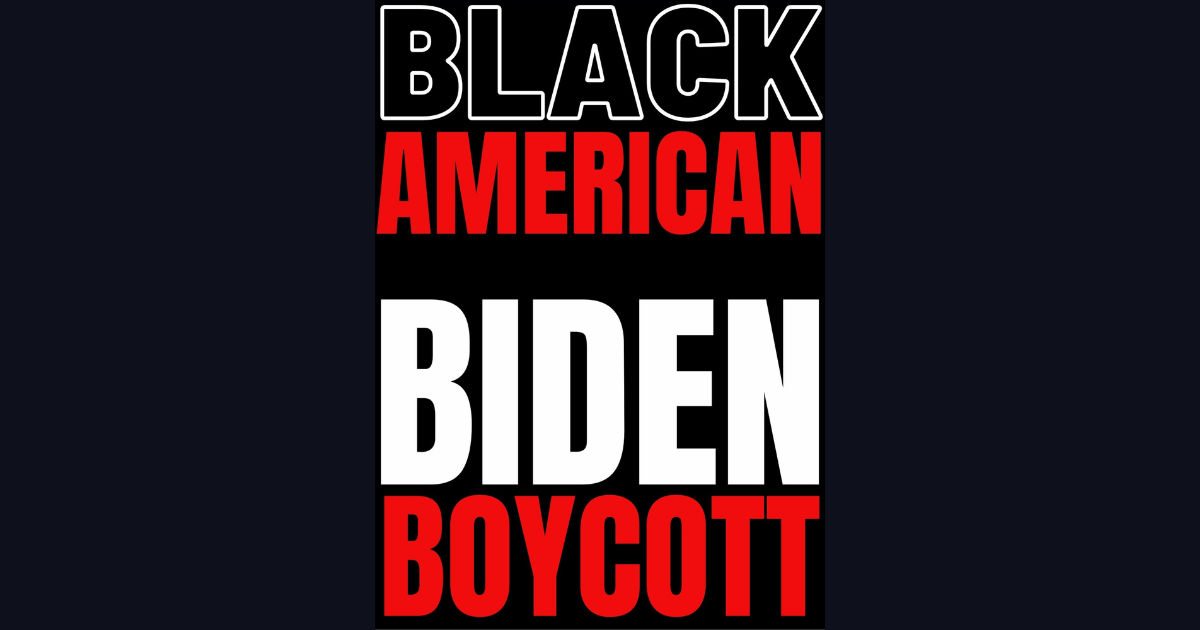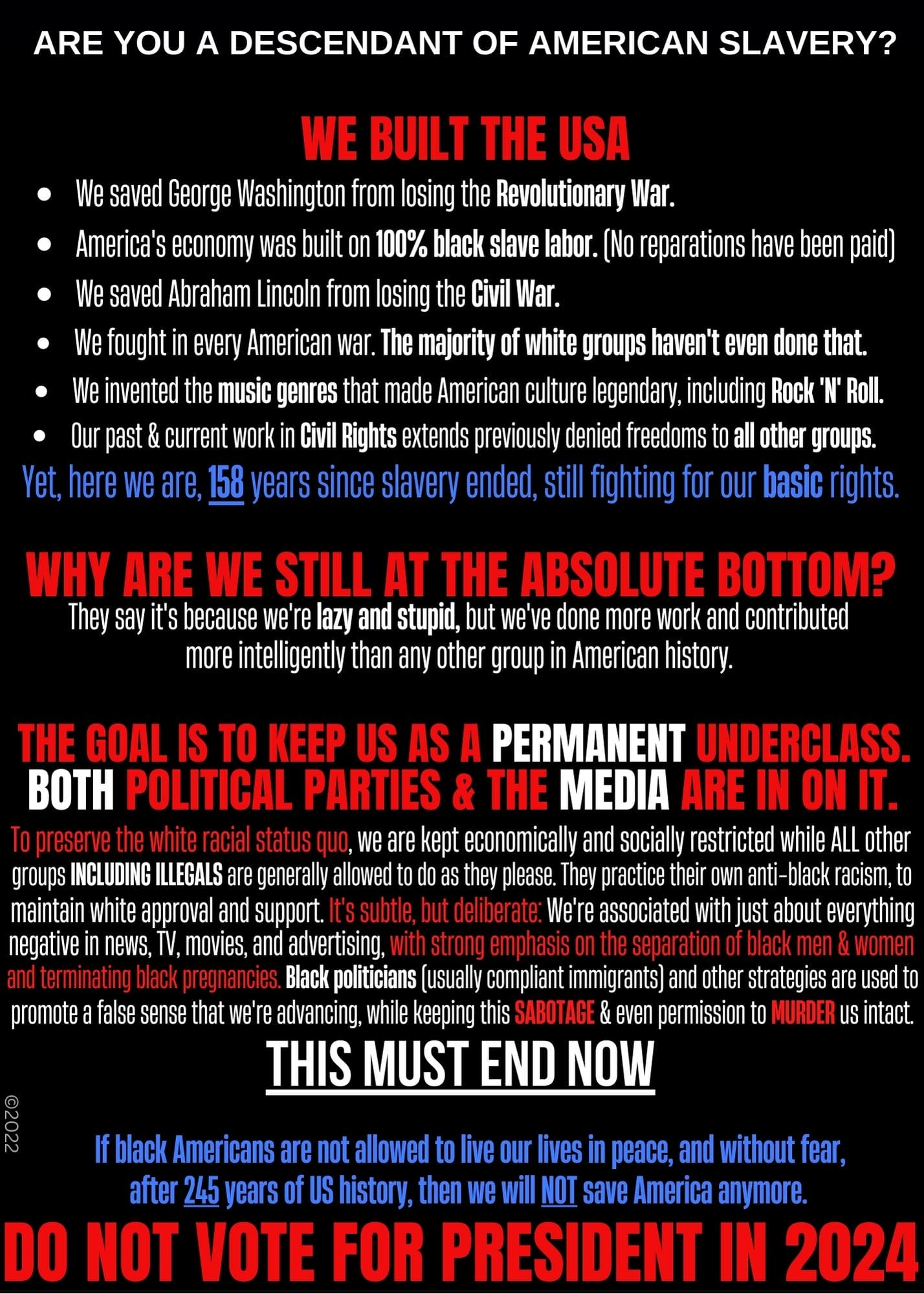The sight of yard signs in support of a political candidate or promoting a slogan is not an unusual sight in Chicago. But a new campaign encouraging Blacks to boycott the 2024 election that is taking root on the South and West sides of the city has caused some to take pause.
The red, white and navy-blue yard signs and companion leaflets are the brainchild of Dennis Pitts, an activist and performer who grew up on the city’s North Side. He started the campaign because he believes Blacks are on a path toward alienation. Despite the renewed conversation around reparations for the descendants of enslaved people, the activist says those in power won’t act without “political force because it simply will not work,” he said.
“We must weaponize our vote because it’s one of the only tools left in the toolbox that can facilitate change,” Pitts said. “We cannot protest each individual incident of racial harm because over time that action becomes tiring—plus (the establishment) has already put measures in place to deal with civil unrest (under the guise of curbing domestic terrorism).
“They have studied our ability to mobilize during the George Floyd protests,” he told the Crusader, “And who the real leaders are and how their groups operate. As long as they can keep us protesting each individual incident that pops up—where they quickly resolve the matter and we immediately dissipate only to wait for another incident—these acts of aggression will continue.”
A recent New York Times exposé alleged Black voter frustration is “bubbling over.” The newspaper also noted in his campaign announcement, “Mr. Biden made no secret of the importance of Black voters to his re-election.” The publication also noted the share of Black voters in the electorate dropped by 1 percent nationally from 2018 to 2022, the biggest drop of any racial group measured, while the share of white, college-educated voters increased.
Biden supporters claim the president has kept his promises to Black citizens and point to the money he’s allocated to historically Black colleges and universities, the appointment of Supreme Court Justice Ketanji Brown Jackson and a declining Black unemployment rate.
“I have not found a lack of enthusiasm,” Representative James E. Clyburn (6th District) of South Carolina, told the Times. “I just haven’t found it. And people keep saying it. But it’s not there.”
It is no secret that most Black Americans vote Democratic. Each election cycle, African American leaders call for a “Black Agenda” to address group concerns before heading into the primaries. And, after each election, many Black voters are left wondering what happened. Black political interests usually take a backseat to fiscal austerity and national calls for cuts to social programs.
According to the Pew Research Center, Black Americans are a strongly Democratic group. More than eight in ten Black adults (84 percent) identify with or lean toward the Democratic Party, while just 10 percent identify with or lean toward the Republican Party. Further, since 1968, no Republican presidential candidate has received more than 13 percent of the African American vote.
Until around 1939 at the end of President Franklin Roosevelt’s New Deal, African Americans pledged strong political allegiance to the Republican Party. According to historians, at least twice between the end of Reconstruction and the first World War, distinguished persons in the Negro community attempted to or advised cooperation with the Democratic Party.
When Black males obtained the right to vote after the passage of the 15th Amendment in 1870, nearly all identified and supported the Republican Party and its candidates because of Abraham Lincoln’s Emancipation Proclamation that ended slavery and charted a course toward full citizenship. In 1965 all Blacks (including women) received the right to vote after passage of the Voting Rights Act.
However, as political power was gradually returned to Southern Democrats, in part through the 1877 Compromise, which resolved the disputed 1876 presidential election, African Americans, who at this time nearly all resided in Southern states, were once again stripped of their voting rights, according to “Steadfast Democrats: How Social Forces Shape Black Political Behavior,” published by Princeton University in 2020.
According to The Negro in Reconstruction, a report by A. Taylor written in 1926, “certain antebellum free Negroes who had been attached to upper class whites by virtue of their occupational roles as barbers, or skilled artisans and some antebellum house servant slave groups who identified their interests with those of their former masters, voted for the Democrats out of conviction.”
By the mid-1960s and after the second Great Migration of southern Blacks to northern cities, African American political loyalties shifted in protest of oppressive Jim Crow policies of the South. With the help of organized labor and allies in the Black church, African Americans gradually flocked to the Democratic Party when Democrats began supporting Civil Rights and have remained loyal and a unified bloc ever since.
The relationship between Blacks and Democrats has not been peaches and cream, even if it has become normalized group behavior.
In 1972, nearly every Black leader and organization in the nation convened in Gary, Indiana, for a Black political convention to explore developing a third, independent party. Even though Rep. Shirley Chisholm sought the presidency, the collective attempted to use the Black vote as a spoiler in hopes of defeating anti-Black policies and politicians. The effort failed.
Citing the treatment of Black and Jesse Jackson delegates to the 1984 Democratic convention, the late Jackson State Professor Mfanya D. Tryman once described the African American relationship with the Democratic Party as the start of a “dissolution of an irreconcilable marriage.”
“If the Democratic Party, as it moves to the right to ‘recapture’ a large segment of the white male vote, has turned its back on Black progress, then Blacks must find another direction which to go,” Tryman said in 1986. “Other socio-economic and ethnic strata have defected from the Democratic Party once it has realized that the ‘working man’s party’ no longer worked for working people. Blacks, however, have continued their allegiance to a party that has become inimical to their concerns and an anathema to their progress.”
Because of Rev. Jackson’s advocacy in 1984 and his second presidential run four years later, the DNC changed its “winner take all” rules, which paved the way for the nation’s first Black president to be elected in 2008.
In 2022, several states passed the John Lewis Voting Rights Act to combat the systemic discriminatory voting laws from being enacted, providing new, legal tools for fighting voting discrimination in court and instructing state judges to interpret laws in a pro-voter manner wherever possible. In April, a coalition of Illinois-based groups designed legislation to restore voting rights to nearly 30,000 formerly incarcerated, disenfranchised individuals.
Despite public grievances Blacks have with the Democratic Party, few are willing to switch to the Republican Party for fear of being associated with the ultra-right-wing histories associated with former President Ronald W. Reagan, current Supreme Court Justice Clarence Thomas, and other politicians with perceived anti-Black and extremist views, such as Georgia Rep. Marjorie Taylor-Greene (14th District) and possible presidential contender Florida Gov. Ron DeSantis. Still others do not want to associate with Republican-centric “Make America Great Again” patriots, thousands of whom violently stormed the U.S. capitol on January 6, 2021, in a rage of white angst.
With nowhere to turn politically, Pitts and his supporters believe Blacks need to rid themselves of all political labels and use their political power as a bargaining chip with the white power structure.
According to Pitts, his campaign is spreading across the U.S., with individuals, organizations and social media influencers distributing leaflets in predominantly Black cities, with Chicago being a center focus. He says the most popular version is the one that asks Black voters to say no to the Biden/Harris ticket.
“The recommendation is we’re looking for Black Americans to specifically withhold our votes from Joe Biden in the 2024 election,” Pitts said. “We’re going to delegitimize the political process here because it’s not legitimate because it doesn’t include us. …The goal is to basically hold the country hostage and withhold our votes under the threat of Trump being re-elected.”
The son of a Black mother and white father, Pitts grew up in Rogers Park and attended Chicago Public Schools before dropping out of high school after six months to pursue a career in music. He gained a following and began touring under the stage name of “Jaws.” When his career slowed, the musician and illustrator continued his education and later opted for an investment career before becoming an activist.
Pitts now lives in Pittsburgh and in addition to investing, he divides his time between work and advocating for social change. He says he found a kindred spirit in a coalition of African Americans who have balked at party politics and have embraced an unapologetic racial identity as “foundational Black Americans.”
“I am part of the new Black media movement that includes Tariq Nasheed and Black Authority and those individuals who are advocating for our empowerment,” Pitts told the Crusader. “I am a foundational Black American who is biracial but has always identified as a Black man. I figured this movement is the truth because they are working to end anti-Black policies across the board.”
Though he and his colleagues deal with pressing, heavy issues, Pitts has found a way to infuse humor into his advocacy.
He created a YouTube program entitled “Three Minutes of Black Empowerment,” featuring a sock puppet who makes mockery of white supremacy, national politics and other issues relating to the Black community. The show has more than 2,500 subscribers, and its videos have received thousands of views and comments.
In the show, Pitts’ puppet persona decries neoliberalism, crime, Democratic voters, various Black elected officials, and other national politicians. The sock puppet resembles a chimp, which the activist says is purposely done to call attention to anti-Black policies.
“It’s just satire mocking white supremacy and racial stereotypes because they usually call us monkeys and so on,” Pitts said. “[I thought] wouldn’t it be funny if a monkey was an intelligent figure. You know, anti-white supremacy. So, I did a couple of shows, and people started catching on to it.”
Though he says he is not “pro-Republican,” Pitts feels Blacks should withhold their votes from both parties until group grievances are resolved. But, he said the fact that neither party wants Donald Trump to regain control of the White House is something Blacks should “use as a wedge issue” to deliver results across the country.
“Both the Dems and Republicans are unified against Blacks—but they also seem to be fractured themselves,” Pitts said. “In addition to how they treat us, they also don’t like Trump. We need to be strategic. One of the biggest mistakes that the American public makes is that Trump is just your average Republican, that is not true. Both political parties are working to get Trump out of the paint. That is a theme and main characteristic of the 2024 presidential election.”
Re-electing Trump would be the unintended consequence to any effort to withhold votes from Biden/Harris. But Pitts said his supporters see this as the only political option from which Blacks can negotiate concessions from the White House and the Congress.
“This is not a pro-Trump strategy, though it appears that way because Black people not voting as a giant bloc for one party that does nothing for us could eventually lead to a Trump victory, but that is not of our concern,” he added. “Going into both national (political) conventions, the issue of where Black people stand and with whom we will give our power should be on their minds.”
The Republican National Convention will be held in July 2024 in Milwaukee.
On April 11, Democratic leaders announced Chicago as host of the Democratic National Convention (DNC) in August. “The DNC is returning to the Midwest, a critical Democratic stronghold: Illinois, along with Wisconsin, Michigan, and Minnesota – part of the “blue wall” – were crucial to the 2020 victory of President Biden and Vice President Harris and to Democrats’ success in the 2022 midterm elections.
“Chicago is a great choice to host the 2024 Democratic National Convention,” said President Joe Biden. “Democrats will gather to showcase our historic progress including building an economy from the middle out and bottom up, not from the top down. From repairing our roads and bridges, to unleashing a manufacturing boom, and creating over 12.5 million new good-paying jobs, we’ve already delivered so much for hard working Americans – now it’s time to finish the job.”
Meanwhile, busloads of asylum-seekers continue to be sent to Washington, D.C., and Chicago from Hidalgo County, Texas. This effort is the brainchild of Texas Gov. Greg Abbott’s controversial Operation Lone Star migrant border initiative, which has sent over 18,570 migrants from the Southwest border on 405 buses since 2022, the governor’s office told Border Report. This includes busing over 9,300 migrants to Washington, D.C.; 6,500 to New York City; 1,800 to Chicago, and nearly 1,000 to Philadelphia.
The arrival of migrants to this welcoming city initially caused little concern. However, when the Lightfoot administration sought to relocate displaced foreigners in predominantly Black neighborhoods without notifying or collaborating with residents. South Shore residents hired an attorney to file a lawsuit to block the city’s plan to relocate hundreds of Venezuelan nationals to an old high school in the heart of their neighborhood. And, this week, Mayor Brandon Johnson, who took office on May 15, visited police stations in a predominantly Hispanic ward and expressed empathy with the migrants.
“We have to make sure that the work that is being done here is done with the true spirit of Chicago,” Johnson said. “Where the philanthropic community, our local elected leaders, our community-based organizations, our public facilities are all working hand in hand to make sure that these families who have travailed through very horrific conditions, that when they arrive here that the city of Chicago and the people of Chicago, we’re going to be here for these families.”
As the new mayor crafts a plan to deal with the humanitarian crisis he inherited from the previous administration, some citizens are already fed up. A group of residents in South Shore asked the courts to enforce a temporary restraining order to halt the city’s plan to relocate migrants to their lakefront neighborhood.
Meanwhile, Pitts said his group of organizers intend to be in Chicago when the DNC kicks off its convention. “Right now, we’re in the early stages of planning exactly how we’re going to surround it,” he said. “No, we’re not looking to get on the floor of the Democratic National Convention. We’re not looking to get in the building and cause any kind of disturbance or anything like that. We’re looking to get the fact out that Black Americans are looking to boycott the vote.
“We’re still in the planning stages,” he added. “This is a small movement that we’re trying to turn national.”
The activist also said although he considers his coalition as small, he has received requests for information and boycott fliers in cities across the country. “Well, there’s an [organizer] in Honolulu, Hawaii, that ordered some a few months ago,” he said. “There’s Philadelphia, Tampa, different cities in Wisconsin, Chicago, Los Angeles, Oakland, Houston, Washington, D.C., Miami and just about every major city in the entire country. We even had an order to come from Alaska.”
Despite his efforts, Pitts may find an unlikely ally in his quest to get Blacks to withhold their votes in 2024—political apathy.
In the last city election, according to the Chicago Board of Elections (CBE), only 35 percent of Chicagoans turned out to vote in the runoff mayoral election. By contrast, 70 percent of registered city voters voted in the last presidential election.
A CBE spokesman told ABC7’s Sarah Schulte, “Turnout dropped after the municipal elections became non-partisan and also noted during the Harold Washington era of city politics, turnout was closer to 80 percent.
“Chicago municipal elections used to get a lot more turnout,” said Max Bever, the Chicago Board of Elections spokesperson. “This has been a very stubbornly consistent trend over the last two decades, where we see this around mid-30s for city-wide turnout.”
“There’s a lot of energy in Chicago right now, anti-Biden energy, anti-Democratic Party energy,” he added. “So if we’re, if we’re able to seriously get this flier where it’s just falling out of the sky on a national level, which is where we’re trying to get it, then that’s going to be a threat to the 2024 presidential election, which is probably going to be one of the most important presidential elections in the history of America.”
Reporting made posssible by the Inland Foundation.








